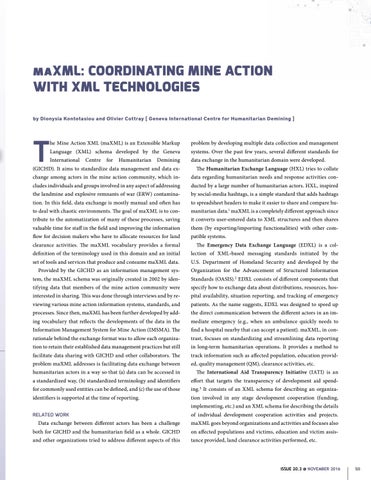maXML: COORDINATING MINE ACTION WITH XML TECHNOLOGIES by Dionysia Kontotasiou and Olivier Cottray [ Geneva International Centre for Humanitarian Demining ]
T
he Mine Action XML (maXML) is an Extensible Markup
problem by developing multiple data collection and management
Language (XML) schema developed by the Geneva
systems. Over the past few years, several different standards for
International
data exchange in the humanitarian domain were developed.
Centre
for
Humanitarian
Demining
(GICHD). It aims to standardize data management and data ex-
The Humanitarian Exchange Language (HXL) tries to collate
change among actors in the mine action community, which in-
data regarding humanitarian needs and response activities con-
cludes individuals and groups involved in any aspect of addressing
ducted by a large number of humanitarian actors. HXL, inspired
the landmine and explosive remnants of war (ERW) contamina-
by social-media hashtags, is a simple standard that adds hashtags
tion. In this field, data exchange is mostly manual and often has
to spreadsheet headers to make it easier to share and compare hu-
to deal with chaotic environments. The goal of maXML is to con-
manitarian data.1 maXML is a completely different approach since
tribute to the automatization of many of these processes, saving
it converts user-entered data to XML structures and then shares
valuable time for staff in the field and improving the information
them (by exporting/importing functionalities) with other com-
flow for decision makers who have to allocate resources for land
patible systems.
clearance activities. The maXML vocabulary provides a formal
The Emergency Data Exchange Language (EDXL) is a col-
definition of the terminology used in this domain and an initial
lection of XML-based messaging standards initiated by the
set of tools and services that produce and consume maXML data.
U.S. Department of Homeland Security and developed by the
Provided by the GICHD as an information management sys-
Organization for the Advancement of Structured Information
tem, the maXML schema was originally created in 2002 by iden-
Standards (OASIS).2 EDXL consists of different components that
tifying data that members of the mine action community were
specify how to exchange data about distributions, resources, hos-
interested in sharing. This was done through interviews and by re-
pital availability, situation reporting, and tracking of emergency
viewing various mine action information systems, standards, and
patients. As the name suggests, EDXL was designed to speed up
processes. Since then, maXML has been further developed by add-
the direct communication between the different actors in an im-
ing vocabulary that reflects the developments of the data in the
mediate emergency (e.g., when an ambulance quickly needs to
Information Management System for Mine Action (IMSMA). The
find a hospital nearby that can accept a patient). maXML, in con-
rationale behind the exchange format was to allow each organiza-
trast, focuses on standardizing and streamlining data reporting
tion to retain their established data management practices but still
in long-term humanitarian operations. It provides a method to
facilitate data sharing with GICHD and other collaborators. The
track information such as affected population, education provid-
problem maXML addresses is facilitating data exchange between
ed, quality management (QM), clearance activities, etc.
humanitarian actors in a way so that (a) data can be accessed in
The International Aid Transparency Initiative (IATI) is an
a standardized way, (b) standardized terminology and identifiers
effort that targets the transparency of development aid spend-
for commonly used entities can be defined, and (c) the use of those
ing.3 It consists of an XML schema for describing an organiza-
identifiers is supported at the time of reporting.
tion involved in any stage development cooperation (funding, implementing, etc.) and an XML schema for describing the details
RELATED WORK
of individual development cooperation activities and projects.
Data exchange between different actors has been a challenge
maXML goes beyond organizations and activities and focuses also
both for GICHD and the humanitarian field as a whole. GICHD
on affected populations and victims, education and victim assis-
and other organizations tried to address different aspects of this
tance provided, land clearance activities performed, etc.
ISSUE 20.3 @ NOVEMBER 2016
59










